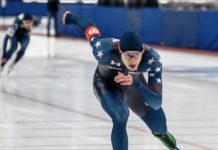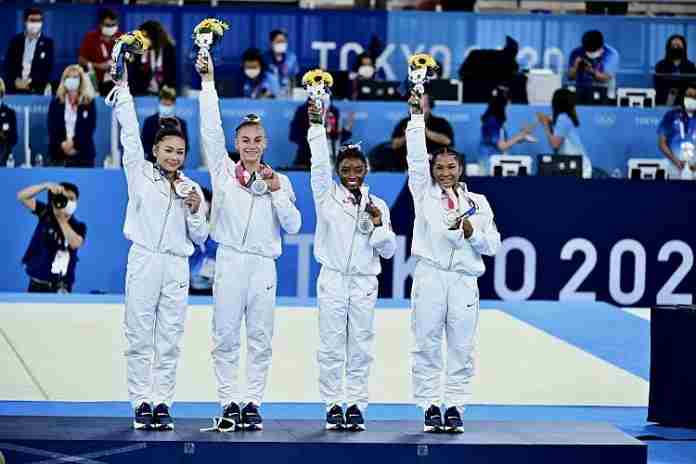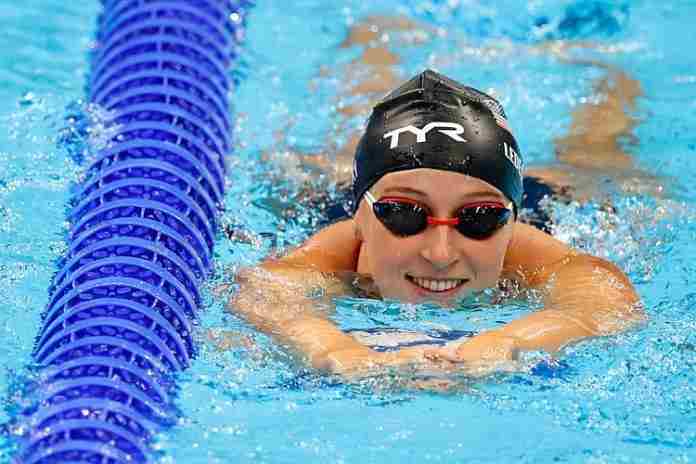(★ Friends: Beautiful! Now 43 donors, who have covered 56% of our current server & support bill. If you like this coverage, please donate here. Your help is so very much appreciated. Thank you. ★)
= TOKYO 2020 =
From Lane One
/Updated/The Olympic Games is about competitions, not coronations.
We have already seen big favorites, such as American skateboarder Nyjah Huston, Chinese divers Yuan Cao and Aisen Chen in the men’s 10 m Synchro, tennis stars Ash Barty of Australia and Japan’s Naomi Osaka all go down. And now Simone Biles, the greatest women’s gymnast of all time.
Biles showed that something was not right during warm-ups on Tuesday, as she appeared to get lost in the air on her last warm-up vault, and then did the same in competition, completing 1 1/2 twists instead of 2 1/2 and then withdrawing.
She left with a trainer and minutes later, USA Gymnastics tweeted:
“Simone Biles has withdrawn from the team final competition due to a medical issue. She will be assessed daily to determine medical clearance for future competitions.”
The rest of the U.S. team – Suni Lee, Grace McCallum and Jordan Chiles – soldiered on and won the silver medal behind the Russian Olympic Committee. Then came the questions. At the post-event news conference, CBS News correspondent Steve Futterman asked Biles about what happened and the pressure of the moment. She explained – with charm, confidence and a clear sense of disappointment – that:
“No injury, thankfully and that’s why I took a step back because I didn’t want to do something silly out there and get injured so that’s why I thought it best for these girls to take over and do the rest of the job, which they absolutely did: they’re Olympic silver medalists now and they should be really proud of themselves for how well they did, last minute, having to go in.
“And it’s been really stressful, this Olympic Games, just as a whole, not having an audience. There are a lot of different variables going in it, it’s been a long week, it’s been a long Olympic process and a long year. So just a lot of different variables and I think we’re just a little bit too stressed out, that we should be out here having fun and sometimes that’s not the case.”
She added later:
“Today has been really stressful. We had a workout this morning and it went OK. And then just that 5 1/2 hour wait or something, I was just like shaking, could barely nap. I’ve just never felt like this going into a competition before. And I tried to go out and have fun, and warm-up in the back went a little bit better, but then once I came out here, I was like, no, mental is not there. So I just need to let the girls do it and focus on myself.”
Biles told reporters in the mixed zone that “There’s more to life than just gymnastics” and as for the All-Around and the Apparatus finals, it will be “one day at a time, we’re going to see how the rest goes.”
The pressure of the Olympic Games is immense, and of this Games in Tokyo – under all of the extra conditions, public dissatisfaction with the Japanese government’s response to the coronavirus – as well as the unprecedented delay of a year, has been enormous. Biles has said so over and over again.
But credit to the Russians, who made the most of their opportunity and to Lee, McCallum and Chiles, who expected to have Biles at their side all night.
There will be those who trumpet this sequence as a turning point for mental health. It would also help if it underscored that the Olympic Games and its sports should be taken more seriously year-round. The drama is just as thick as in any domestic team league.
(Errata: Steve Futterman is a CBS News correspondent, not from the Associated Press as originally listed.)
¶
The Tokyo Games have completed 72 events out of 339; the medal leaders:
1. United States, 25 (9-8-8)
2. China, 21 (9-5-7)
3. Japan, 18 (10-3-5) and Russian Olympic Committee, 18 (7-7-4)
5. Great Britain, 13 (4-5-4)
Of course, TSX prefers our 10-8-6-5-4-3-2-1 scoring by event, giving a much more “diverse, equitable and inclusive” view of the relative achievements of the teams:
1. United States, 278.5
2. China, 215
3. Russian Olympic Committee, 200
4. Japan, 194.5
5. Great Britain, 151
6. Italy, 146.5
7. France, 124.5
8. Korea, 113
9. Canada, 88.5
10. Australia, 83.5
11. Netherlands, 71
12. Germany, 68.5
¶
NBC’s audience is growing, as the network announced a total primetime audience of 15.3 million for Saturday’s primetime programming across NBC-NBCSN-CNBC-USA Network and 19.2 million on Sunday. That’s much higher than the 8.2 million for Friday’s Opening Ceremonies, but far behind Rio in 2016 (when events were live in U.S. time zones).
~ Rich Perelman
= RESULTS: TUESDAY, 27 JULY =
● Canoe-Kayak: Women’s K-1 Slalom
Mistakes usually decide these races and although favored Jessica Fox (AUS) whipped through the course almost three seconds faster than anyone else, her two penalties – totaling four seconds – placed her third after German Ricarda Funk and defending champion Maialen Chourraut of Spain.
Poland’s Klaudia Zowlinska took the early lead at 1:08.98 – with four penalties – but was passed on error-free rides by Chourraut in fourth position (1:06.63) and then by Funk (1:0550), starting eighth. Both Chourraut and Funk rode clean and Fox, starting last, was under pressure to ride fast and clean. But she incurred a penalty at the fourth gate and then again just nearing the finish at gate 24. Those four seconds turned her 1:02.73 winner into a 1:06.73 bronze medal. This was the third straight Games with a medal for Fox: silver-bronze-bronze.
Funk scored Germany’s first win in this event since 1992.
● Cycling: Women’s Mountain Bike/Cross Country
Leading almost from the start, Switzerland’s 2017 World Champion Jolanda Neff ran away with the 20.55 km Cross Country gold medal, but the shock came after her.
While Neff won by 1:11, she was trailed by three-time World Champion Pauline Ferand Prevot (FRA) and Swiss teammates Sina Frei and Linda Indergand. At midway, Ferrand Prevot dropped back and Frei and Indergand charged ahead and had a 12-second lead on the rest of the field.
They held it to the finish, giving the Swiss a sweep with Frei 1:11 behind, then Indergand +1:19 and Hungary’s Kata Blanka Vas coming up for fourth, 2:09 behind Neff. Ferrand Prevot faded to 10th and France’s Loana Lecomte, undefeated this season in the UCI World Cup, finished sixth.
Haley Batten was the top American, in ninth and defending champ Jenny Rissveds (SWE) was 14th. It’s the first-ever medals sweep by one country in the event’s Olympic history.
● Diving: Women’s 10 m Synchro
China’s Jiaqi Zhang and Yuxi Chen were expected to win and they did with ease, winning all five dives and scoring 363.78, winning by more than 50 points. In the six times this event has been held at the Games, China has won all six.
The fight behind them was not as close as expected. American Olympic rookie Delaney Schnell and Rio veteran Jessica Parratto teamed up and after a shaky start, moved from sixth to fourth on their third dive, then all the way to second after their fourth dive and nailed their final try – a back 2 1/2 somersaults with 1 1/2 twists – to score second and clinch the silver medal with an impressive 310.80 score. That was 11.1 points up on Mexico’s Gabriela Agundez and Alejandra Orozco. Favored Canadians Meaghan Benfeito and Caeli McKay ended up fourth after botching their fourth dive – they were last – and moving from second to fifth.
Parratto had been seventh in this event in Rio with Amy Cozad, but made to the podium this time.
● Equestrian: Team Dressage
Germany came in the favorite and dominated the event, with Isabell Werth, Dorothee Schneider and Jessica van Bredow-Wendl scoring 8,178.0 to easily top the U.S. (7,747.0) and Great Britain (7,723.0).
Von Bredow-Wendl had the highest score of the day at 2,785.5, followed by Werth (2,740.5) with Schneider fourth (2,652.0). Sabine Schut-Kery of the U.S. had the no. 3 score at 2,684.5 and Steffen Peters (2,558.5) and Adrienne Lyle (2,504.0) were solid enough to hold off Britain.
Peters gets a second straight Olympic medal for the U.S. – third in Rio – and American teams have now won medals in six of the last eight Games.
For Werth, the gold is another jewel in her crown: she now has seven Olympic golds dating back to 1992, with one individual win and six Team dressage victories. Schneider won her second Team Dressage gold to go along with a silver from 2012. Germany has now won this event 14 times and in nine of the last 10 Games.
● Fencing: Women’s Team Epee
Seventh-seed Estonia ousted second-seed Poland in the quarterfinals, sixth-seeded Italy in the semis and then beat fourth-seed Korea in the final, 36-32, for its first-ever women’s fencing medal in the Olympic Games.
The team of Katrina Lehis, Julia Beljajeva, Erika Kirpu and Inna Embrich were steady in the final, and it came down to Lehis against In-Jeong Choi, a 10-6 win for Lehis that clinched the victory after almost 55 minutes.
Italy squeezed by China in the bronze-medal match, 23-21. The U.S. was eliminated by Korea in the quarterfinals, 38-33.
● Gymnastics: Women’s Team
The most dramatic program of the day saw superstar Simone Biles get lost in the air on a practice vault – an event in which she was the Rio winner and two-time World Champion – and then do the same in competition, scoring only 13.766 to 14.666 for teammate Jordan Chiles and 14.300 for Grace McCallum. This never happens.
She left the floor with a trainer and then withdrew, with USA Gymnastics issuing a statement that this was due to a “medical issue.” In fact, Biles withdrew from stress, but that left Chiles, McCallum and Suni Lee to complete the event and chase Russia.
They gave it a try, but without the top-end firepower from Biles, the Russians outscored the U.S. on Vault, Bars and Floor and ran away with a 169.528-166.096 victory and the first-ever win for Russia in the women’s Team event. The “Unified Team” – essentially the by-then dismantled USSR – won in 1992 after the Soviets won in Seoul in 1988.
Lilia Akhaimova had the top score of the day on Vault (14.733); Lee won the Uneven Bars at 15.400; Viktoriia Listunova scored 14.333 for the best on Beam and also led on Floor at 14.166. The U.S. had some trouble on the Floor finale, scoring only 38.866 – worst of the eight teams – but still had enough balance to win silver, the eighth straight Games with a medal in this event.
Great Britain performed solidly, notably second on Vault and third on Floor and won bronze at 164.096, with Italy fourth (163.368) and Japan fifth (163.280). China, third in qualifying, had a rough time and was seventh (161.196). It’s not easy.
Comparison: the U.S. – with Biles in form – scored 172.330 at the 2019 Worlds to defeat Russia (166.529). Without Biles – and despite a game effort from Jordan Chiles replacing her – the U.S. scored 166.096 in Tokyo.
● Judo: Women’s 63 kg
Yet another spine-tingling final between France’s Clarisse Agbegnenou and Slovenia’s Tina Trstenjak could not be settled in regulation time. But Agbegnenou reversed the Rio 2016 results with a waza-ari in 4:37 of gold time to win her first Olympic gold to go with five World Championship wins.
Canada’s Catherine Beauchemin-Pinard won one bronze with a victory over Anriquelis Barrios (VEN) and Italy’s Maria Centracchio surprised Juul Franssen (NED) for the other bronze.
● Judo: Men’s 81 kg
Not quite the fairy-tale ending some had hoped for, but close. Japan’s Takanori Nagase, the 2015 World Champion, defeated Mongolia’s Saeid Mollei in the gold-medal final in extra time by waza-ari after 5:43.
That Nagase made the final was not a surprise, but Mollaei’s story – the 2018 World Champion who left Iran under pressure after being in the 2019 Worlds to throw a match to avoid facing Israeli Sagi Muki – was one of the storylines of the Games. He almost met Muki, but the Israeli was defeated by Austria’s Shamil Borchashvili in the round of 16; Mollaei won by ippon over the Austrian in the semifinals.
Borchashvili won a bronze medal by defeating Dominic Ressel (GER) by ippon and 2021 World Champion Mattias Casse (BEL) won the other bronze, also by ippon, against Georgia’s Tato Grigalashvili in a re-match of the 2021 Worlds final.
Japan is now four-for-four in men’s Judo, with three classes to go.
● Shooting: Air Pistol Mixed Team
In its first Olympic edition, China defeated Russia in a reversal of the 2018 World Championships in the gold-medal match by 16-14 with Ranxin Jiang (10.7) and Wei Pang (10.1) out-shooting Vitalina Batsarashkina (10.5) and Artem Chernousov (9.8) in the final frame: 20.8 to 20.3 to earn the final two points.
Ukraine had a slightly easier time in the bronze final, defeating Serbia., 16-12.
● Shooting: Air Rifle Mixed Team
Another new event and like the Air Pistol team final, was tightly contested, with China completing a sweep of the day.
Qian Yang and Haoran Yang trailed Americans Mary Tucker and Lucas Kozeniesky, 9-5, after seven frames, but then won five of the next six frames to take a 15-11 lead. The U.S. won the next frame, but China took the final frame and won gold by 17-13.
Russia had little trouble with Korea in the bronze match, winning 17-9.
● Softball
Softball returned to the Olympic Games after a 13-year wait, but it was Beijing 2008 all over again when the U.S. and Japan met in the gold-medal match.
Just as it was in 2008, Cat Osterman was on the mound for the U.S. and Yukiko Ueno was pitching for Japan. The game was scoreless through three innings, with Ally Carda brought on for the U.S. in the third after pitching so effectively the day before.
But Japan scored runs in the fourth and fifth, first on a Mana Atsumi single and in the fifth on a Yamato Fujita single following a wild pitch. That turned to be enough.
Ueno was masterful, giving up only two hits in six innings and with Miu Goto finishing the seventh, Japan had a 2-0 victory and a second straight Olympic gold medal. Ueno got the win in a 3-1 victory in the gold-medal game in 2008 and at 39, is unlikely to be available when the sport re-emerges at the 2028 Olympic Games in Los Angeles.
The U.S. and Japan both finished 5-1 for the tournament; Canada defeated Mexico, 3-2, for the bronze medal. Canada’s Jenn Salling won the batting title at .571 (8-14) and Fujita had three home runs and seven RBIs to lead all players. Five pitchers had 0.00 ERAs, led by Americans Monica Abbott (20.1 innings) and Osterman (14.2), but Japan got to Carda when it counted.
● Surfing: Men and Women
The first appearance of surfing in the Games was a memorable one, with two dramatic finishes.
The weather required condensing the schedule, but it made for lively waves and Brazil’s Italo Ferreira, the 2019 World Surfing Games winner, dominated Japan’s 2021 silver medalist Kanoa Igarashi, 7.77-3.83 on the first ride and 7.37-2.77 on the second for a 15.14-6.60 final score.
Australia’s Owen Wright won the bronze with a tight, 11.97-11.77 win over Gabriel Medina (BRA).
The women’s tournament saw two Americans – Carissa Moore and Caroline Marks – get to the semifinals. Moore, the winner of four medals (two gold) in six World Surf League events in 2021, won over Amuro Tsuzuki of Japan, 8.33-7.43 in the second semi; South Africa’s Bianca Buitendag defeated Marks, 11.00-3.67.
In the final, Moore was outstanding, winning both match-ups by 7.60-5.23 and 7.33-3.23 for a 14.93-8.46 and setting off a wild celebration with teammates and fellow competitors on the beach. Tsuzuki grabbed the bronze medal over Marks, 6.80-4.26.
This was a popular event in its first edition; the 2024 competition is slated for Tahiti, still technically a part of France!
● Swimming: Women’s 100 m Backstroke
Australia’s Kaylee McKeown came in as the world-record holder and was the favorite, but Canada’s Kylie Masse led after 50 m over American Rhyan White. But McKeown’s superior underwater technique brought her to the front on the final lap and she and Masse dueled to the wall, with McKeown nursing a small lead. She finished in 57.47, an Olympic Record and the second-fastest swim all-time to her own world record (57.45) from June.
Masse’s 57.72 is the no. 6 performance of all-time in second and 0.02 behind her own national record of 57.70 from the Canadian trials.
American Regan Smith, who had the Olympic Record after the semifinals at 57.86, was also strong in the second half and was third in 58.05 – at age 19 – and White was fourth in 58.43.
● Swimming: Women’s 100 m Breaststroke
This was crazy. All the attention was on defending Olympic champ Lilly King in lane 5 and Olympic Record-setter Tatjana Schoenmaker of South Africa in 4. And they took off from the start, took to the lead and Schoenmaker got to the turn first, 0.30 ahead of King.
Off the turn, it was clear that King was going to have a hard time catching Schoenmaker, but 17-year-old Lydia Jacoby was gaining stroke by stroke in lane 3. And gaining and gaining and drawing even with Schoenmaker with 20 m left, she got to the wall first with a perfect final stroke in 1:04.95, making her the no. 6 performer in history. At 17.
King was game, but did not have the finish to do more than claim the bronze in 1:05.54, well off her Trials win in 1:04.79. It’s the second straight time that the U.S. won two Olympic medals in this event and extends the streak of medals in this event to four straight.
● Swimming: Men’s 200 m Freestyle
Korea’s Sunwoo Hwang, just 18, took it out hard, steaming through the first 100 m in 49.78 and continuing in front at the final turn, but then the field came back.
Brazil’s Fernando Scheffer was closest to Hwang at 100 m and 150 m, but then the world leaders – Brits Duncan Scott and Tom Dean – moved hard to get into contention as Hwang faded. Scheffer tried to keep pace, but Scott was in front with 25 m left and he and Dean swam almost together, stroke for stroke, in lanes 4 and 6, to the wall … and Dean got there first.
Dean finished in 1:44.22, fastest in the world this year, with Scott at 1:44.26 and Scheffer with the bronze in 1:44.66. Hwang faded to seventh (1:45.26) and American Kieran Smith didn’t have enough closing speed to contend for a medal and was sixth (1:45.12).
Dean’s time is only 14th-best in history, but is the fastest since 2013 and the no. 4 performance ever in a textile suit. He and Scott made history as the first British Olympic medalists ever in this event.
● Swimming: Men’s 100 m Backstroke
Russians Kliment Kolesnikov and Evgeny Rylov came in with eight of the top 10 times in the world in 2021 and Kolesnikov got out best and he and Rylov were 1-2 at the turn.
Defending champion Ryan Murphy of the U.S. was a close third at the turn, but was never able to gain significantly on either. Rylov, in lane 2, was out of sight of Kolesnikov in lane 5 and powered to the wall in 51.98 with Kolesnikov in 52.00 – the two fastest times of 2021 – with Murphy third in 52.19, a seasonal best.
Rylov’s win was the seventh-fastest in history and Kolesinkov was no. 8. It broke a streak of six straight wins in this event for the U.S. and was the first ever in the event for Russia. In fact, no “Russian” has ever won a medal in this event; Igor Polyansky of the USSR won a bronze in 1988 for the last of three Soviet medals in this event in Olympic history.
● Taekwondo: Men’s 80+ kg
Let there be no doubt that the Russia’s Vladislav Larin is the best in the world. The 2019 World 87 kg champ won his bouts by 24-3 (over Tonga’s Pita Taufatofua), 16-3, 30-3 and then 15-9 in the final against North Macedonia’s surprise finalist, Dejan Georgievski. That a combined score of 85-18.
Behind him, Cuba Rafael Alba – the 2019 World 87+ kg winner – won a bronze over Hongyi Sun (CHN), 5-4; Korea’s Kyo-Don In took the other bronze, also by 5-4, against Ivan Trajkovic (SLO).
● Taekwondo: Women’s 67+ kg
It’s hard to sustain greatness over long periods of time, so let’s salute Serbia’s Milica Mandic – the London 2012 gold medalist – who won her second Olympic title with a 10-7 win over Korea’s 2019 World Champion Da-Bin Lee.
Now 29, Mandic reached the Rio quarterfinals, but was back for more and won her bouts by 13-0, 11-4, 7-5 and then 10-7 in the final.
Britain’s Bianca Walkden, one of the favorites, had to settle for bronze, beating Aleksandra Kowalczuk (POL: 7-3) while France’s Althea Lauren was a surprise bronze winner, overcoming Aminata Traore (CIV) by 17-8.
● Triathlon: Women
With so little racing in the World Triathlon Series during the pandemic, the question was who was the most fit?
A sign that the field was in shape came right away as Britain’s Jessica Learmonth led – as she often does – out of the water in 18:24, hotly pursued by Vittoria Lopes (BRA) and 2018 World Champion Katie Zaferes of the U.S.
Then Zaferes took over on the bike phase, a little unusual for her, and she was one of the leaders heading into the 10 km run, with German Laura Lindemann, two-time World Champion Flora Duffy (BER) – in her fourth Games – and Learmonth. A former Syracuse track star, Zaferes was well positioned, but Duffy would not be denied.
She stormed to a 33:00 on the run, easily the fastest in the field and won going away in 1:55:36, winning Bermuda’s first-ever Olympic gold. Britain’s 2019 World Champion Georgia Taylor-Brown ran 33:52 – second-fastest in the field – and came from 22 seconds behind the leaders to grab second, 1:14 behind, in 1:56:50. Zaferes ran 34:27, sixth-fastest on the day, and held on for third in 1:57:03. Rachel Klamer (NED) came from ninth to fourth in 1:57:48, well behind Zaferes.
The other Americans were Summer Rappoport in 14th and Taylor Knibb in 16th.
● Weightlifting: Women’s 59 kg
No doubts for 2019 World Champion and current world-record holder is Hsing-Chun Kuo of Chinese Taipei, lifting an Olympic Record of 236 kg, including records for the Snatch (103 kg) and Clean & Jerk (133 kg).
Behind her, it was Turkmenistan’s Polina Guryeva who surprised in second at 217 kg, followed by Japan’s Mikiko Andoh (214 kg).
● Weightlifting: Women’s 64 kg
Canada’s Maude Charron made four of her six lifts and scored a modest upset by winning this class at 236 kg, ahead of Giorgia Bordignon of Italy (232 kg) and Wen-Huei Chen of Chinese Taipei (230 kg).
Colombia’s Mercedes Perez completed only one of her Snatch attempts and one Clean & Jerk attempt and finished fourth at 227 kg.
Charron, a silver medalist at the 2017 Worlds, moved up from sixth at the 2019 Worlds. .
Elsewhere:
● Team/Basketball: The U.S. women got underway with an 81-72 win over Nigeria in Group, winning its 50th straight game in Olympic competition. A’ja Wilson had 19 for the U.S. and a game-high 13 rebounds. Brittney Griner added 13 and 10 rebounds and Diana Taurasi had 10. The U.S. shot 44% from the floor to only 27% for Nigeria, but the latter put up 84 shots to 66 for the Americans.
Next up is Japan on the 30th.
● Team/Beach Volleyball: Top-seeded April Ross and Alix Klineman won their second straight Pool B match in Tokyo by 21-13, 21-16 over Spain’s Liliana Fernandez and Elsa Baquerizo in 38 minutes on Tuesday. Their last pool match is on the 30th.
In the men’s division, Nick Lucena and Phil Dalhausser scored an important win in Pool D with a 2-1 win (24-22, 19-21, 15-13) win over Brazilian stars Alvaro Filho and Alison Cerutti to even their record at 1-1. Each has one more match in the group, on the 29th.
● Team/Football: The U.S. women finished Group G play with a 0-0 draw against Australia and moved on to the quarterfinals as second in their group with a 1-1-1 record. Th Aussies had 61% possession in the game and led in shots, 8-7. An Alex Morgan goal in the 33rd minute, but a video review showed she was barely offside.
Both teams moved on to the quarters, with Great Britain facing Australia, Sweden vs. Japan, the U.S. vs. the Netherlands and Canada vs. Brazil, all on the 30th.
● Team/Volleyball: The U.S. women were in action again, beating up on China – 29-27, 25-22, 25-21 – to go to 2-0 in the tournament. Jordan Thompson led the U.S. with 34 points, on 28-50 kill attempts, four blocks and two service aces. Michelle Bartsch-Hackley had 15. The American women play Turkey next on the 29th.
● Team/Water Polo: The U.S. men went to 2-0 in Group A by crushing South Africa, 20-3, thanks to four goals by Ben Hallock.
The U.S. women, also 2-0, will play Hungary today (28th) in Group B play.
● Tennis: Another shocker, as Japan’s second-seed Naomi Osaka was defeated in the third round, 6-1, 6-4 by Czech Marketa Vondrousova, 22, currently ranked no. 118. With the departure of top-seed Ash Barty (AUS) in the first round, the highest-remaining seed is Ukraine’s Elina Svitolina.
= PREVIEWS: WEDNESDAY, 28 JULY =
(23 events across 11 sports)
● 3×3 Basketball: Men and Women
The U.S. women are into the semifinals, losing only to Japan, 20-18, after clinching their playoff berth. Stefanie Dolson (Chicago Sky), Allisha Gray (Dallas Wings), Kelsey Plum (Las Vegas Aces) and Jackie Young (Las Vegas Aces) finished 6-1, with Russia, China and Japan all at 5-2.
In the quarterfinals, China defeated Italy, 19-13 and France defeated Japan, 16-14. That pits the U.S. in a rematch with France, with the Americans winning the first game impressively by 17-10. China and Russia will play in the second semi, with the medals matches later the same day.
¶
The men’s tournament has Serbia as the clear favorite, after finishing 7-0 in pool play; Belgium, Latvia and the Netherlands were all 4-3.
In the quarterfinals, 3-4 Russia beat the Netherlands, 21-19, and Latvia edged Japan, 21-18. That will pit Serbia against Russia in one semi and Belgium and Latvia in the other. In the round-robin play, Serbia clubbed Russia, 21-10 and Belgium barely beat Latvia, 21-20.
● Cycling: Road Time Trials
The men’s Time Trial is a two-lap, 44.2 km race at the Fuji International Speedway, with 2020 World Champion Filippo Ganna as the favorite, just ahead of Belgian star Wout van Aert (second), Swiss Stefan Kung (third), Geraint Thomas (GBR: fourth), Rohan Dennis (AUS: fifth), Kasper Asgreen (DEN: sixth) and Remi Cavagna (FRA: seventh).
There are many more stars, including Slovenia’s Primoz Roglic, a talented time trialer, Australian Richie Porte and American Brandon McNulty. At the 2021 Tour de France, the two time trials were won by Tadej Pogacar (SLO ~ not entered), with Kung second, van Aert fourth and Asgreen sixth. Stage 20 was a win for van Aert, ahead of Asgreen, with Kung fourth.
¶
The women’s time trial, at the same location, is one lap at 22.1 km, with 2020 World Champion and 2016 Rio bronze medalist Anna van der Breggen (NED) as the top seed. Those who followed her across the line at the Worlds last year have the high seeds: Marlen Reusser (SUI: second), Lisa Brennauer (GER: fourth), Grace Brown (AUS: fifth), followed by road stars Annemiek van Vleuten (NED), Emma Jorgensen (DEN), Elisa Longo Borghini (ITA) and Ashleigh Moolman (RSA). Van Vleuten won the women’s road race on the 25th with Longo Borghini taking the bronze.
Americans Amber Neben (seeded 7) and Chloe Dygert (seeded 2) are both potential medalists. Neben, 46, was World Champion in 2008 and 2016 and always has a surprise ready in races where she is counted out. Dygert, 24, who will also compete on the track, won the world title in 2019. Both will be trying to follow in the steps of Kristin Armstrong, who won this race in 2008-12-16.
● Diving: Men’s 3 m Synchro
After Great Britain’s upset of China in the 10 m Synchro event, anything is possible. And, in fact, Britain is the defending Olympic champ in this event, with Jack Laugher and Chris Mears springing the upset in Rio as China’s Yuan Cao and Kai Qin were third.
In 2021, Laugher is back with Daniel Goodfellow, and this pair won the 2019 Worlds silver medal behind Cao and Siyi Xie. For Tokyo, Xie is back, but paired with Zongyuan Wang.
These two teams appear to be the class of the field. The U.S. won silver in Rio with Sam Doman and Michael Hixon and Hixon is back, but with Andrew Capobianco this time. Mexico’s 2019 Worlds bronze winners Yahel Castillo and Manuel Celaya are back and Germany’s Patrick Hausding and Lars Rudiger (fourth) and Russians Evgeny Kuznetsov and Nikita Shleiker (fifth) will be contenders.
Expect China’s focus to be extraordinary; they know well that they lost the 10 m Synchro because of one bad dive. They want to avoid that happening again.
● Equestrian: Dressage
Two-time defending champion Charlotte Dujardin (GBR) is back, but is currently ranked only no. 109 in the world, despite a bronze at the 2018 World Equestrian Games. Four-time World Equestrian Games Champion Isabell Werth (GER) is in, winner of this event in the 1996 Games in Atlanta and silver medalist in 2000-08-16. She is the top seed.
In between is Dutch star Edward Gal, winner of two golds at the 2010 World Equestrian Games and American Steffen Peters, who won two bronzes in the same event.
Also expected to contend as Werth’s teammates Jessica von Bredow-Werndl and Dorothee Schneider and Denmark’s Catherine Dufour. Or will there be a horse that has its own ideas and takes its rider to the podium?
● Fencing: Men’s Team Sabre
This event returns to the program for the first time since 2012, when Korea defeated Romania in the final. More recently, Korea won again – with Bon-Gil Gu still on the squad – at the 2019 World Championships over Hungary, with Italy third and Germany fourth.
Gu, Tokyo bronze medalist Jung-Hwan Kim and Seng-Uk Oh are all back from Korea’s 2019 team and will be a formidable presence, as will Hungary with Tokyo Olympic winner Aron Szilagyi – his third straight Olympic gold – along with Andras Szatmari and Tamas Decsi.
Italy is in the mix with Luca Curatoli, Tokyo silver medalist Luigi Samele and Enrico Berre and the U.S. will try to improve on a disappointing showing in the individual event, with Eli Dershwitz, Daryl Homer and Andrew Mackiewicz on the piste.
● Gymnastics: Men’s All-Around
There will be a new champion, as Japan’s two-time winner, Kohei Uchimura did not contest this event. However, the stars of the 2019 World Championships are in, as Russians gold and silver medalists Nikita Nagornyy and Artur Dalaloyan (the 2018 World Champion) were 2-6 in the Team qualifying.
Japan’s Daiki Hashimoto led the qualifying at 88.531, followed by Nagornyy (87.897), 2017 World champ Ruoteng Xiao (87.732) and Wei Sun (87.298) from China and Great Britain’s Joe Fraser (86.298). Add in Dalaloyan (85.947) and Takeru Kitazono (JPN: 85.948) and you have the likely medal contenders.
The top American in the qualifying was U.S. champion Brody Malone (11th: 85.298), with Sam Mikulak at 84.664 in 14th. Neither figures as a medal contender this time; Mikulak was seventh in Rio.
● Judo: Women’s 70 kg and Men’s 90 kg
Japan is counting on 2017 and 2018 World Champion Chizuru Arai in this weight class, but she will have her hands full with 2021 World Champion Barbara Matic of Croatia as well as bronze winners Sanne van Dijke (NED) and Michaela Polleres (AUT).
More Worlds medalists from 2019 are in: Barbara Timo (POR: silver) and Margaux Pinot (FRA: bronze), plus two-time Worlds bronze winner Maria Bernabeu (ESP), Puerto Rico’s Maria Perez (2017 silver) and Brazil’s 2020 Pan American champ Maria Portela.
Japan has won four of the six weight classes so far, but only one of three in the women’s division. Arai will be primed for another.
● Rowing: Men’s Double Sculls-Quadruple Sculls-Fours
This sport is being tossed about by the changing weather conditions in Tokyo and may be re-arranged again. The pandemic has caused significant problems in participation at World Rowing World Cup events, so it’s hard to know where the favorites are.
In the Double Sculls, Melvin Twellaar and Stef Broenink (NED) were the fastest semifinal qualifiers at 6:20.17, trailed by China’s 2019 World Champions, Zhiyu Liu and Liang Zhang (6:23.11). France’s Hugo Boucheron and Matthieu Androdias won semi one, with the second-fastest time of the day at 6:20.45, with Great Britain at 6:22.95.
In the Quadruple Sculls, Germany is the two-time defending Olympic champion, but didn’t make it to the A-Final. Instead, Poland – the 2019 Worlds silver medalists – won semifinal two with the quickest time of the day (5:29.25), pressed by Worlds bronze medal winners Italy (5:29.38).
Reigning World Champion Netherlands won semi one at 5:39.80, well clear of Australia (5:41.54). These four teams appear to be the medal winners.
In Fours, Poland, Romania and Great Britain took the 2019 Worlds medals, but the British have won this event in five straight Olympic Games, with Australia winning silver in the last three.
So, it’s no surprise that Australia (heat one: 5:54.27) and Britain (heat two: 5:55.36) had the fastest times in the semifinals, trailed by the U.S. (heat one: 5:57.27) and Italy (heat two: 5:57.67.
Romania also made the final, but Poland lost out in the repechage and will be in the B-final. Six straight for the Brits?
● Rowing: Women’s Double Sculls-Quadruple Sculls-Fours
The women’s Double Sculls appears to be ready for a re-match of the 2019 Worlds, won by New Zealand’s Brooke Donoghue and Olivia Loe over Romania (Nicoleta Ancuta-Bodnar and Simona Radis) and the Netherlands (Roos de Jong and Lisa Scheenaard).
In the semis, the Romanians dominated New Zealand (Donoghue and Hannah Osborne now), 7:04.31-7:09.05. The Dutch had the second fastest time in winning semi two in 7:08.09, ahead of Canada (7:09.44) and the U.S. (7:11.14). Don’t count the New Zealanders out yet.
The women’s Quadruple Sculls belonged to Germany at the 1992-96-2000-04 Games and then again in Rio in 2016 after a bronze in Beijing and a silver in London. And the Germans crossed first in semi one at 6:18.22, followed by the Netherlands (6:19.36)
But China had the fastest time of the day in winning semi two (6:14.32), with Poland at 6:18.62, backing up their 2019 World Championships gold over Poland and the Dutch. The Chinese have the same line-up as in 2019 – Yunxia Chen, Ling Zhang, Yang Lyu and Xiaotong Cui – and are clear favorites for gold. But look for the Germans to make it closer than expected.
The women’s Fours has only been once – in 1992 – but returns to the program in Tokyo. Australia ran away with the world title in 2019, winning by 2.1 seconds over the Netherlands and more than four seconds over Denmark.
No surprise that in the heats, the Aussies had the best time of the day at 6:28.76, but the surprise was Ireland – fourth in 2019 – which pressed the champs all the way to the line, just 0.23 behind at 6:28.99. Another effort like that will win them a medal.
The Dutch won the first heat in 6:33.47, more than five seconds up on China (6:38.54). Australia is the clear favorite, but can Ireland produce another effort like the heats?
● Rugby Sevens: Men
New Zealand, Fiji and South Africa all finished group play with 3-0 records and advanced to the quarterfinals.
In the quarterfinals, New Zealand sped by Canada, 21-10 and the U.S. lost to Great Britain, 26-21, after having a 21-0 lead!
Argentina ousted South Africa, 19-14 and Fiji shut down Australia, 19-0.
Fiji defeated Great Britain, 43-7 in the Rio final and they appear to be on a collision course again.
● Swimming: Women’s 200 m Free-1,500 m Free-200 m Medley
Australia’s Ariarne Titmus, the world leader at 1:53.09, used her now-familiar tactic of going out easy and then coming back like a rocket on the final lap to win the first semi in 1:54.82. Hong Kong’s Siobhan Haughey was second in 1:55.16, but London 2012 champ Allison Schmitt of the U.S. was fifth in 1:56.87 and did not qualify for the final.
Katie Ledecky of the U.S. led all the qualifiers at 1:55.28, then took control of the second semi by 75 m and won easily in 1:55.34. Czech Barbora Seemanova was an impressive second in 1:56.14 and then Italian star Federica Pellegrini – the London 2008 champion, in her fifth Olympic Games and still the world-record holder – was third in 1:56.44.
Ledecky qualified third for the final and will have to take it out hard to match Titmus’s faster finish. Pellegrini’s world mark of 1:52.98 is in danger.
¶
The women’s 1,500 m should be a showcase for Ledecky, finishing an impossible schedule of the 400 m Free, 200 m Free and 1,500 m Free over three days. She’s the world-record holder (15:20.48), owns the top 11 times in history and led the qualifying (15:35.35) over China’s Jianjiahe Wang – who swam 15:41.49, as Asian Record! – by more than six seconds. American Erica Sullivan was third in the heats at 15:46.67 – a lifetime best and no. 4 in the world this season – and is a contender for a medal. (No, Australia’s Titmus is not in this event.)
Wang, Maddy Gough of Australia and Italy’s Simone Quadarella are all capable of winning medals and with Sullivan, will try to follow Ledecky to the finish.
¶
The women’s 200 m Medley looks like a six-way fight for medals, with Americans Kate Douglass (2:09.21) and Alex Walsh (2:09.57) – both 19 – winning the semifinals with Abbie Wood (GBR), Yiting Yu (CHN), Japan’s Yui Ohashi and Sydney Pickrem (CAN) all swimming in the 2:09s as well.
Defending champion Katinka Hosszu of Hungary was seventh in the semis and does not appear to be in the medal fight (emphasize “appear”).
The U.S. has won a medal in this event in five straight Games, but hasn’t won since Tracy Caulkins did it way back in 1984 in Los Angeles.
● Swimming: Men’s 200 m Butterfly-4×200 m Free
There is very little doubt about the favorite in the men’s 200 m Fly, with world-record holder Kristof Milak (HUN) cruising to a 1:52.22 win in the second semi, the no. 3 time in the world for 2021 (Milak has the top five marks).
Milak was more than 2 1/2 seconds up on Brazil’s Leonardo de Deus (1:54.97) and almost three seconds better than semi one winner Chad le Clos of South Africa, the London 2012 champion and fourth in Rio.
For the U.S., Gunnar Bentz was sixth overall and made the final. But this race is all about Milak and whether he will smash his 2019 world record of 1:50.73. The current Olympic Record of 1:52.03 by Michael Phelps of the U.S. in 2008 is a goner.
¶
In the men’s 4×200 m Freestyle, the open 200 m Free results show Britain with the two best legs in Tom Dean and Duncan Scott, but Russia, Australia and the U.S. are clear medal contenders.
The year list shows these teams will fight for the medals, perhaps with Hungary and Italy having an outside shot. But who can deal with the British stars on the anchor?
● Weightlifting: Men’s 73 kg
The script is familiar: China enters with the world-record holder and the 2018-19 World Champion Zhiyong Shi. He is an overpowering favorite and expected to win easily.
The fight for silver and bronze should be contested by 2019 bronze winner Bozhidar Andreev of Bulgaria, fifth-place Briken Calja (ALB), Venezuela’s Julio Mayora and perhaps American Clarence Cummings, Jr.
A great age-group and junior star, Cummings was ninth in the 2017 Worlds at 69 kg, then 12th in 2018 at 73 kg and ninth last year. He shoots for high weights and a superb performance could put him in reach of a medal. But well behind Shi, of course.
= INTEL REPORT =
Not widely noticed, but still amazing, was seeing 46-year-old Oksana Chusovitina (UZB) competing in her eighth Olympic Games in gymnastics. She was 14th in the Vault during the qualifying and did not qualify for the final. But she owns an Olympic silver medal from Beijing in 2008in the Vault and has competed for her birth country of the USSR, the 1992-only “Unified Team,” Germany and Uzbekistan.
A mom, she is directly supported by the International Olympic Committee through its Olympic Scholarship program, which reaches 1,836 athletes from 186 counties in 27 sports. In Tokyo, there are 836 scholarship athletes from 178 National Olympic Committees competing in 26 sports. Chusovitina is pretty special.
¶
Just seven more Covid-19 positives reported by Tokyo 2020 for 27 July. That brings the total to 155, with 71 of these contractors, 51 “Games-concerned personnel,” 18 athletes, nine media and six Tokyo 2020 staff and volunteers.
The testing report by stakeholder group:
● Athletes and team officials: 19 positives out of 106,798 tests through 245 July (0.02%)
● Media/Tokyo 2020 staff: 33 positives out of 132,620 tests through 25 July (0.02%).
In addition, the U.S. Olympic & Paralympic Committee is now publishing positives, with one positive reported among the 1,038 athletes and officials in Tokyo as of 24 July, none among 1,144 on 25 July and none among 1,172 delegates on 26 July.
¶
The U.S. Center for SafeSport has classified for marathon star and controversial coach Alberto Salazar as permanently ineligible based on “Sexual Misconduct; Emotional Misconduct.”
The posting, on 26 July on the Center’s Centralized Disciplinary Database notes that the finding is “Subject to appeal / not yet final.”
This is a different finding than that made by the U.S. Anti-Doping Agency in September 2019, leading to a four-year ban. Salazar has appealed that decision and a hearing was held earlier this year, but without any announced decision as yet.
You can receive our exclusive TSX Report by e-mail by clicking here. You can also refer a friend by clicking here, and can donate here to keep this site going.
For our 649-event International Sports Calendar for 2021 and beyond, by date and by sport, click here!























